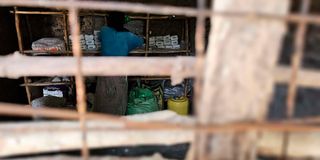Meet 62-year-old woman who turned her home into thriving business after sexual assault

Xaxa*, a granny who was raped last year at the age of 62, in her shop on November 13, 2024. She was making her way home at 8:30pm after a long day of toiling at a roadside food kiosk in her village in Kilifi County.
What you need to know:
- After being raped by her former customer while walking home from her roadside kiosk in Kilifi, 62-year-old Xaxa spiralled into depression and became suicidal.
- Her attacker, a drug-addicted school dropout who later allegedly raped 10 other women, was initially released on bail but is now in remand awaiting trial.
- Through support from the International Justice Mission, Xaxa has found new hope by converting one room in her house into a shop, allowing her to continue trading while staying safely indoors.
At 8:30pm on an ordinary evening early last year, Xaxa* was making her way home after a long day of toiling and sweating at a roadside food kiosk in her village in Kilifi County.
Having sold rice and beans alongside charcoal, she had earned a remarkable Sh1,330 — a considerable sum for her on that day. At 62 years old, Xaxa was the sole businesswoman operating at the centre, directly opposite a primary school that also served as a boda boda stage.
With a large sufuria perched precariously on her head and her bag containing the day's earnings slung over her shoulder, Xaxa walked with a sense of joy along the dark, dusty murram road, bordered by low bushes that rustled softly in the evening breeze.
The walk home, usually a pleasant 15 minutes, took a horrific turn just five minutes into her trek.
Without warning, a man lunged at her from behind, seizing her by the neck and dragging her into the nearby undergrowth where he raped her.
“He had a knife and warned me that he would slit my throat if I screamed for help,” she recounts painfully through her husband, who acted as her translator, as she spoke solely in Giriama. Having never attended school, her grasp of Swahili was limited to a few words.
Her husband was once a tout and supplied her with the charcoal she sold.
To her dismay, she recognised her attacker — a young man, half her age, who had dropped out of the primary school directly opposite her kiosk. He was known in the village for his drug abuse and often stopped by to eat at her stall.
Upon her traumatic return home, bleeding and sobbing in agony, Xaxa's eldest son hastily took her to the hospital on a shared motorbike with his mother.
After receiving medical care, they promptly reported the assault to the nearest police station. The suspect was arrested, but shockingly, he was released on cash bail shortly thereafter.
Meanwhile, Xaxa found herself enveloped in a deep, dark pit of despair, spiralling into depression. Her husband, aged 65, observed her constant tears and the way she sat staring blankly into space throughout the night. Despite his attempts to coax her into taking a bath or eating, she remained unresponsive to his care.
“I was genuinely afraid she was going to starve herself to death,” he recalls, anguish etched on his face.
“I tried so hard to console her, assuring her that I would always stand by her, to love her no matter what had happened, and to remind her that she should never blame herself. But it felt like she was in her own world, completely detached from reality. I was also devastated, suffocating inside, but I surrendered all to God.”
Xaxa herself described feeling utterly lifeless, with haunting suicidal thoughts constantly invading her mind.
“I kept asking myself, ‘Why didn’t I leave earlier? Why did he choose me?’ I don’t ever want to see him again. The mere mention of the centre sends shivers down my spine. I refuse to go near that place again,” she says with palpable agony.
The area assistant chief echoed the community's concern, sharing that after the perpetrator was released, at least 10 women, some elderly, reported having been raped by him shortly thereafter.
“We arrested him again, and since then, I haven’t received any reports of rape in this area,” he noted.
“The case is currently ongoing at the Kilifi Law Courts, and the perpetrator remains in remand prison.”
The local administrator added that idleness caused by unemployment, coupled with school dropouts and drug abuse, contributes significantly to the sexual violence that plagues the community.
“They are led to believe that they can heal or gain wealth by violating a girl or elderly woman through witchcraft,” he explained.
However, the violation that shattered Xaxa’s world also disrupted her fragile economic stability, forcing her to close her kiosk and plunge into an abyss of despair.
It was only through the intervention of a counsellor from the International Justice Mission (IJM) — a global organisation dedicated to protecting people in poverty from human trafficking, modern slavery, violence, and police abuse of power —that she began to see a glimmer of hope. The area chief had alerted IJM to her dire situation and her need for pro bono legal assistance, which the organisation has since provided.

Kalisto Badia, Coordinator of Survivor Services at IJM's Mombasa branch, during an interview on November 15, 2023.
“By the time the case was referred to us, she was in a fragile state of mind,” shares Kalisto Badia, Coordinator of Survivor Services at IJM's Mombasa branch.
“We have been able to offer her individual counselling sessions as well as family therapy to facilitate healing and support her loved ones as they come to terms with her trauma.”
Additionally, the organisation assists her family with transport fare to attend court proceedings.
However, it was a particularly special initiative that has aided her recovery and helped stave off her suicidal thoughts.
“We engaged in conversations with the survivor, exploring what she might like to pursue in life. She expressed a desire to run a business again but from the safety of her home. Consequently, we helped her open a wholesale shop within her house,” Kalisto explained.
The shop occupies one room of her two-room dwelling, with the other room serving as the bedroom. The passageway to the shop lies directly opposite her bedroom door; come nightfall, all she has to do is close the main door, and when it is time for rest, she simply crosses over without stepping outside into the world that had once betrayed her.
“I feel alive again. Being surrounded by my husband and children makes me feel safe. If it hadn’t been for their counselling and this shop, which keeps me occupied, I believe I would have succumbed to despair,” she says, a newfound spark of hope in her voice.
Nevertheless, Xaxa still relies on Kalisto to procure her supplies, as the trauma of passing by the centre remains too overwhelming for her to bear.
Kalisto observes, “Healing is a gradual process, and for some survivors, it can take years, even with counselling.”
*Name changed to protect her identity, and the assistant chief is anonymous to avoid revealing her identity.





